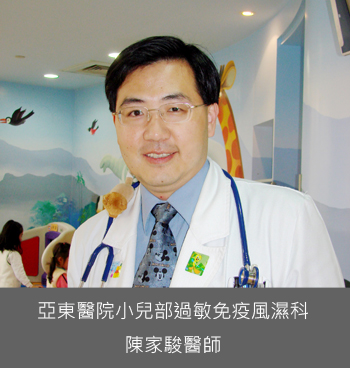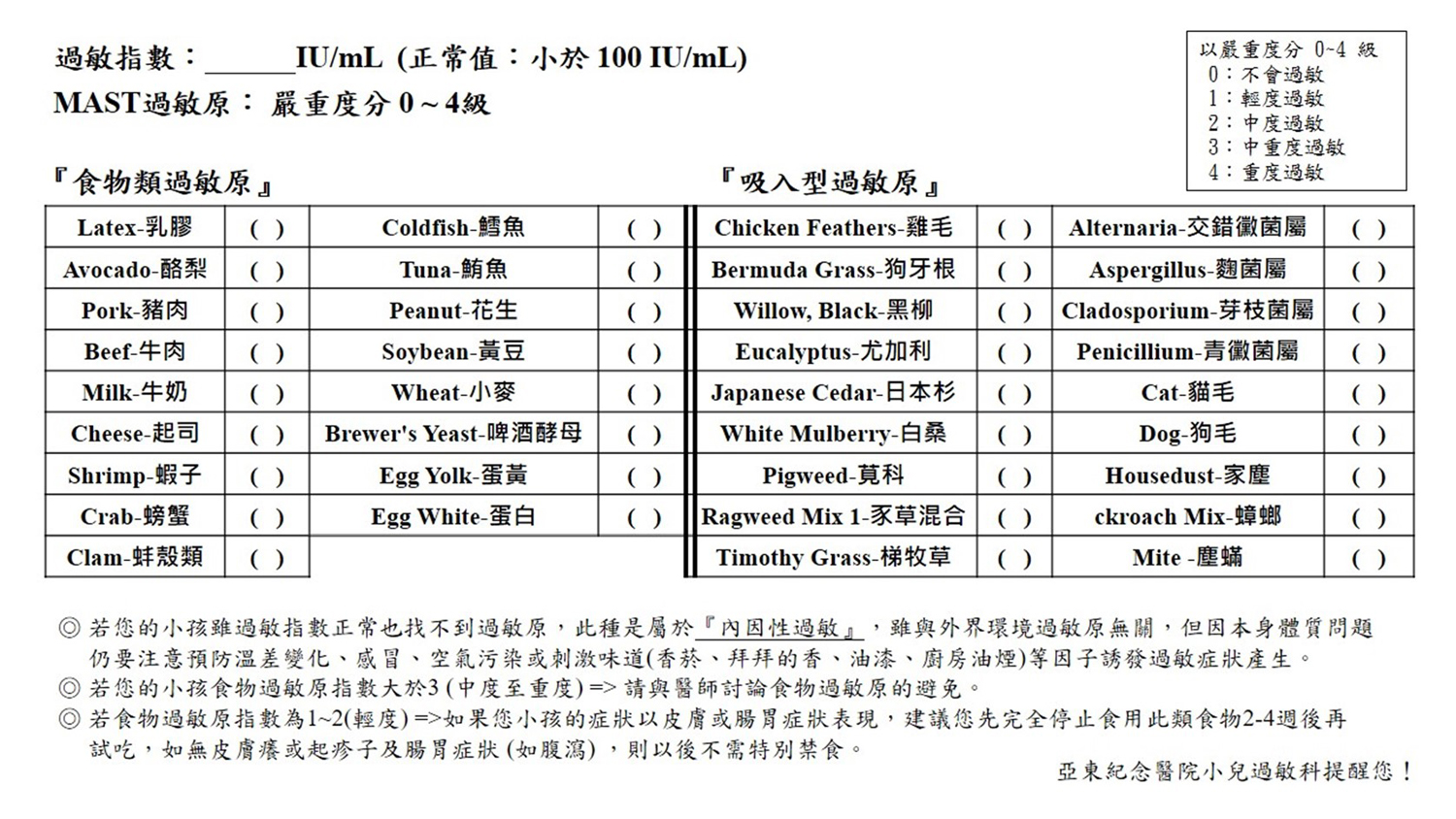04.2024 Life Guide
Allergen testing protects children's health
Dr. Chen Jiajun from the Allergy, Immunology, and Rheumatology Department of Far Eastern Memorial Hospital /


 Allergy is one of the concerns of parents and healthcare workers during the growth of children. It is an hypersensitive reaction caused by immune mechanisms, which is influenced by three factors: genetic factors, exposure to allergens, and environmental factors (such as exposure time, amount, and frequency). Symptoms such as skin redness, swelling, difficulty breathing, and digestive problems gradually develop into allergic diseases such as atopic dermatitis, allergic rhinitis, asthma, and food allergies. In severe cases, it may lead to allergic shock and may also affect children's sleep quality, attention, academic or social activities. In this issue of "Health Column", you will learn about the "enemies (allergens)" lurking around children.
Allergy is one of the concerns of parents and healthcare workers during the growth of children. It is an hypersensitive reaction caused by immune mechanisms, which is influenced by three factors: genetic factors, exposure to allergens, and environmental factors (such as exposure time, amount, and frequency). Symptoms such as skin redness, swelling, difficulty breathing, and digestive problems gradually develop into allergic diseases such as atopic dermatitis, allergic rhinitis, asthma, and food allergies. In severe cases, it may lead to allergic shock and may also affect children's sleep quality, attention, academic or social activities. In this issue of "Health Column", you will learn about the "enemies (allergens)" lurking around children. Introduction to Allergens
Introduction to AllergensAllergens are a natural substance that is usually harmless to most people, but for individuals with a genetic predisposition to allergies, the immune system in the body releases specific immunoglobulin (IgE) antibodies, which activate other immune cells in the body to produce allergic reactions to the substance, leading to allergic symptoms. According to statistics, the common allergens in Taiwan are ranked in order: dust mites, cockroaches, pet hair such as dogs or cats, mold, pollen, etc.
Allergen testing
Before conducting allergen testing, an allergy immunologist will carefully inquire about the child's medical history, including past allergic reactions or symptoms, as well as possible exposure to allergens. They will then examine their physical condition, especially symptoms related to allergies. After preliminary evaluation, the possibility of allergies is determined based on medical history and physical examination results, and further options for allergen testing are provided to confirm allergens and develop appropriate treatment plans.
Three categories of objects eligible for health insurance allergen payments
At present, the objects eligible for health insurance allergen benefits include patients with asthma, allergic rhinitis, and atopic dermatitis under the age of 2. Other conditions include acute urticaria, allergic conjunctivitis, etc. Although there is no health insurance benefit yet, in order to improve treatment effectiveness, the public can also self pay for allergen testing to facilitate targeted treatment.
The allergen testing process that meets the "health insurance benefits" is divided into two stages:
Phase 1, Allergic constitution screening: The physician shall indicate the allergic history, clinical symptoms, and severity in the medical record, and issue immunoglobulin E and allergen specificity tests. The former is commonly known as "Allergy Index" (Total IgE, normal value less than 100 IU/mL), used to speculate whether one has an allergic constitution; The latter (CAP Phadiatop, normal value less than 0.35 kU/L) is designed for general inhalation allergens and contains screening for dust mites, cockroaches, pet hair such as dogs or cats, mold, etc. If one of the test results is positive, it will enter the second stage of testing.
Phase 2, Specific Allergen Testing: Far Eastern Memorial Hospital provides two major systems that can simultaneously evaluate the response of multiple specific allergens in a single test.
1. MAST (Multiple Antigen Simultaneous Test): A semi quantitative method is used to simultaneously detect the IgE concentrations of 36 specific allergens in human serum. There are many items that can be tested at once, but a large amount of blood is required.
2. CAP set (ImmunoCAP) ™ Total allergen testing: It can perform quantitative testing on various allergens (such as inhaled allergens, food allergens, fruit allergens, molecular allergens, etc.), and hospitals can also create their own sets. Due to high costs, there are fewer items that can be tested for a single health insurance benefit, and the required blood volume is also relatively small.
Table 1: Preliminary report example of 36 common specific allergen tests in MAST Taiwan
Six Key Reminders for Allergen Testing
Through allergen testing, parents and physicians can grasp what substances their children are allergic to, thus accurately formulating preventive measures and treatment plans. The following are six key points to remind:
If one excessively restricts their diet due to concerns about allergies, it may lead to immune system imbalance or nutritional imbalance.
Early detection and avoidance of contact with allergens are crucial for disease control.
3. Allergen testing is not necessarily better with multiple items. If the condition requires it, acute allergen immunoglobulin E (IgE) can be tested. However, whether the test for chronic allergen IgG has clinical significance still needs to be discussed with a specialist.
4. The report on allergen testing should be read and educated by a physician who has received allergy and immune related training. For example, if an allergy to eggs is detected, it is not impossible to eat eggs.
5. In addition to avoiding environmental allergens (inhalation or food), the treatment of allergic diseases also requires regular tracking and treatment, as well as avoiding other triggering factors.
If parents are still concerned or have a need for testing, it is recommended to consult an allergy specialist to confirm if there is a need for self funded testing.
conclusion
Finally, in addition to controlling environmental hygiene, Far Eastern Memorial Hospital also offers a self funded allergy immunotherapy called "Dust Mite sublingual Ingot" to increase specific IgG4 protective antibodies against dust mites, which is the most common allergen in Taiwan. Relevant indications and self funded details can also be consulted with an allergy specialist.
Recognizing the enemy (allergen) and taking preventive measures is essential to improve children's quality of life and create a healthier and happier environment for their growth.
Dr. Chen Jiajun's expertise includes: asthma, nocturnal cough, persistent allergic rhinitis, atopic dermatitis, food and drug allergies, acute and chronic urticaria, gout, arthritis, lupus erythematosus, and other autoimmune diseases, as well as congenital immunodeficiency.
#




















